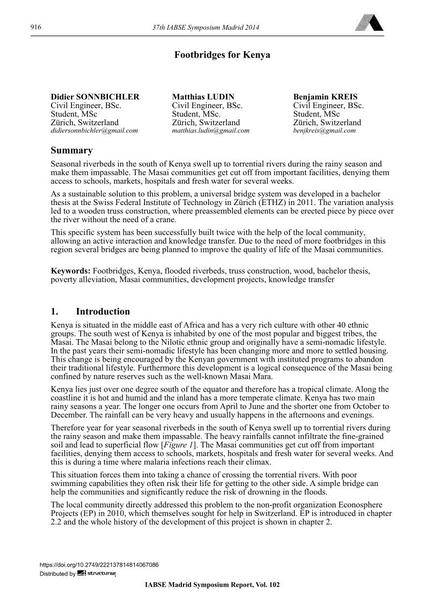Footbridges for Kenya

|
|
|||||||||||
Bibliografische Angaben
| Autor(en): |
Didier Sonnbichler
Matthias Ludin Benjamin Kreis |
||||
|---|---|---|---|---|---|
| Medium: | Tagungsbeitrag | ||||
| Sprache(n): | Englisch | ||||
| Tagung: | IABSE Symposium: Engineering for Progress, Nature and People, Madrid, Spain, 3-5 September 2014 | ||||
| Veröffentlicht in: | IABSE Symposium Madrid 2014 | ||||
|
|||||
| Seite(n): | 916-923 | ||||
| Anzahl der Seiten (im PDF): | 8 | ||||
| Jahr: | 2014 | ||||
| DOI: | 10.2749/222137814814067086 | ||||
| Abstrakt: |
Seasonal riverbeds in the south of Kenya swell up to torrential rivers during the rainy season and make them impassable. The Masai communities get cut off from important facilities, denying them access to schools, markets, hospitals and fresh water for several weeks. As a sustainable solution to this problem, a universal bridge system was developed in a bachelor thesis at the Swiss Federal Institute of Technology in Zürich (ETHZ) in 2011. The variation analysis led to a wooden truss construction, where preassembled elements can be erected piece by piece over the river without the need of a crane. This specific system has been successfully built twice with the help of the local community, allowing an active interaction and knowledge transfer. Due to the need of more footbridges in this region several bridges are being planned to improve the quality of life of the Masai communities. |
||||
| Stichwörter: |
Fußgängerstege Fußgängerbrücken Holz Fachwerkverbindung
|
||||
